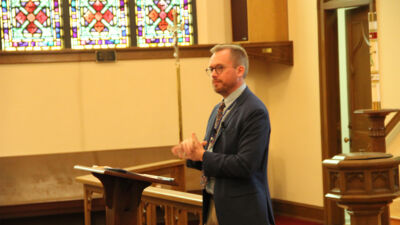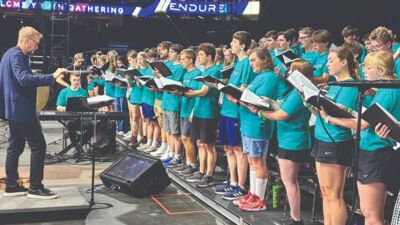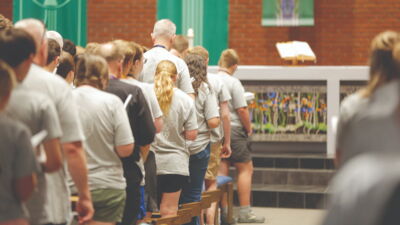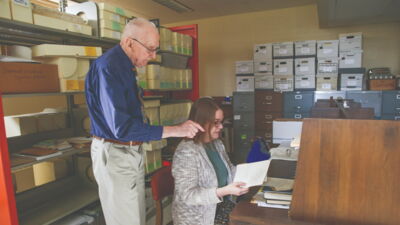Dr. Haley's Goal for a Human Education

At the end of Dr. Gabriel Michael Haley’s college career, he cleaned the ice cream machine in his dining hall for an hour a week. It wasn’t convenient timing for him, and he didn’t really need the job, but he did work in the dining hall his freshman year. For Haley, working in the dining hall at the end of college as well at the beginning "felt symmetrical,” so he did it. This anecdote is not just one of a personality quirk, but of a deeper relentless striving to live life as it should be lived, which is an enduring theme that Haley has carried throughout his life.
Haley did not always want to be an English professor. “When I was a kid, I wanted to do everything but teach English. I wanted to be a scientist for a long time,” said Haley. He was slowly convinced to pursue a degree in English because of the power of a good book. Haley reflected that, “Everyone always asks me what my favorite novel is as an English professor, and I decided a while ago that it would be “Great Expectations.” The only time I read it was in middle school, but I remember that it was the first time I really noticed the greatness of a book.” After this, Haley kept reading, “I kept reading a lot of great books and found that books are really a conversation among authors across generations.”
Haley decided that he wanted to continue being a part of this conversation. He decided to go to Hillsdale College and major in classics and English. It was at this point when he made the shift from not just studying literature but teaching it. After that, he taught in Slovakia for a year, and then he came back to the United States and got his master's and doctorate degrees in English at the University of Virginia. “Hillsdale really emphasized the teaching side of research,” said Haley. “I decided to move on to get my Ph.D., because of what I could share with others through what I learned.”
Haley wanted to teach not only about books, but about what a great book can do to one’s humanity. He was inclined to think this way when he read “Leisure as the Basis of Culture” by Josef Pieper. Haley said, “Pieper wrote during World War II, and he nevertheless stressed the importance of a non-utilitarian education. People still need to pursue creative ventures even under times of unique stress. A great books education is about learning to be human, to recognize that to be human is to have many vocations beyond being just a worker.”
Haley tries to teach people to be human beings in his Introduction to Literature classes, which he says are among his favorite classes to teach. “The best things I can hear from students are that I was hard but fair,” Haley remarked with a chuckle. “I try to keep a high standard for what I do. I start with more accessible texts, and then I sometimes drop students into the deep end with a hard text.” Haley believes that keeping high standards for his students respects their ability to consider a text in more depth. “When students spend time contemplating literature, they start to realize that great books are not just a collection of idiosyncratic likes, but material that can lead to philosophical and theological conversations.”
Haley finds that his goals to educate the whole human being are continually aligned with goals already present at Concordia. “I want to be at a place that understands the human being properly. I want to teach the whole person and understand what we do in the context of being a whole person. That’s what I like about Concordia. The holistic vision of the human being.”
Haley wanted to expand this education of the whole human being to high school students. Last year, he started Trinity Academy, a Lutheran high school on Concordia’s campus that meets in a guest house on Concordia’s campus. “I saw a gap in our Seward community where we don’t have a Lutheran high school. I proposed the idea for a Lutheran high school with a great books curriculum. They have a few staff members hired full and part time, and students experience lessons such as lessons that range from rich discussions about The Iliad and Medea, to a trip to a local farm to learn about grasses and soils, to woodworking in collaboration with the Center for Liturgical arts. “The curriculum is about intellectual and character development and developing well-educated citizens. That is what it should be about.”
In his free time, Dr. Haley likes to cook, watch movies, play tennis, and spend time with his family. He is married to Jane, and they have four children: Vesper (14), Leo (12), Gloria (10), and Iris (8).
Are you interested in pursuing a classical education at Concordia? Learn more here.


